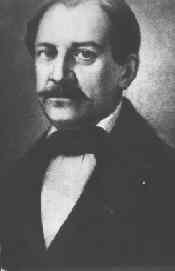Constantin Negruzzi
- View a machine-translated version of the Romanian article.
- Machine translation, like DeepL or Google Translate, is a useful starting point for translations, but translators must revise errors as necessary and confirm that the translation is accurate, rather than simply copy-pasting machine-translated text into the English Wikipedia.
- Consider adding a topic to this template: there are already 328 articles in the main category, and specifying
|topic=will aid in categorization. - Do not translate text that appears unreliable or low-quality. If possible, verify the text with references provided in the foreign-language article.
- You must provide copyright attribution in the edit summary accompanying your translation by providing an interlanguage link to the source of your translation. A model attribution edit summary is
Content in this edit is translated from the existing Romanian Wikipedia article at [[:ro:Constantin Negruzzi]]; see its history for attribution. - You may also add the template
{{Translated|ro|Constantin Negruzzi}}to the talk page. - For more guidance, see Wikipedia:Translation.
Constantin Negruzzi | |
|---|---|
 | |
| Born | 1808 (1808) Trifeștii Vechi, Principality of Moldavia, (today Hermeziu, Iași County, Romania) |
| Died | August 24, 1868(1868-08-24) (aged 59–60) Iași, United Principalities of Moldavia and Wallachia |
| Occupation | Poet, novelist, playwright, translator, politician |
| Language | Romanian |
| Nationality | Romanian |
| Period | 1837–1862 |
| Literary movement | Romanian 1848 Movement |
| Children | At least 2 sons, one of which was Iacob Negruzzi |
| Parents | Dinu Negruț and Sofia Hermeziu |
Constantin Negruzzi (Romanian pronunciation: [konstanˈtin neˈɡrutsi]; first name often Costache [kosˈtake]; 1808–24 August 1868) was a Romanian poet, novelist, translator, playwright, and politician.
Born in Trifeștii Vechi, Moldavia, he studied at home with a Greek teacher.[citation needed] He admitted in a later article that he learnt Romanian by himself, from a book written by Petru Maior. During the 1821 Revolution, his family took refuge in Chișinău, Bessarabia, where he met Alexander Pushkin and became interested in literature.
Notable among his writings are his memoirs – Amintiri din junețe ("Memories of youth") – and his historical writings, Fragmente istorice ("Historical fragments"), Negru in alb ("Black in white"), Aprodul purice (an aprod was a minor noble title, typically the son of a lord; Purice is a proper name, but literally means "flea"; see Movilești). He translated some of the ballads of Victor Hugo, some of Thomas Moore's poetry and Antiochus Kantemir's poetry. Negruzzi wrote two plays, Muza de la Burdujeni ("The Muse of Burdujeni") and Cârlani ("Lambs"), while translating several other plays.
Negruzzi also held several functions, including finance minister and deputy under Sturdza-Vodă. A supporter of liberal causes, he was twice exiled to his house in Trifești for criticism of the government. His son was the writer Iacob Negruzzi.
See also
References
- Dimitrie R. Rosetti [ro] (1897) Dicționarul contimporanilor, Editura Lito-Tipografiei "Populara"
External links


- Biography of Costache Negruzzi












